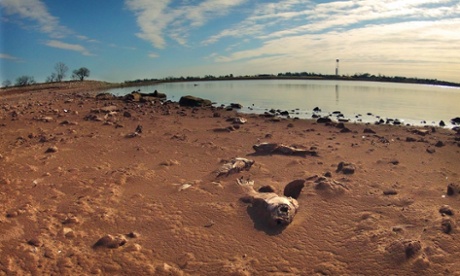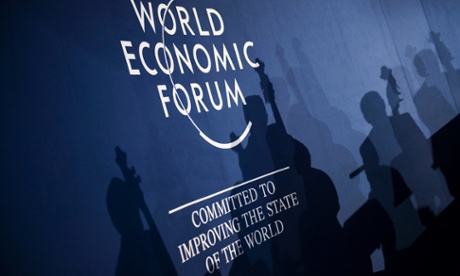We've achieved more at Davos this year than before
The final word goes to Paul Polman, CEO of Unilever. Heralded as one of the leaders of the sustainable business movement, he reflects on high-level discussions across health, poverty, climate economy, women's empowerment, sustainable agriculture, nutrition and the need for a sustainable society.
Georg Kell: much achieved on sustainability but a long way to go
The executive director of the UN Global Compact had this to say as he made his way back down the mountain:
Geopolitical and macro-economic issues continue to dominate the public debate of the world's premier business networking forum. But against the backdrop of global warming, rising inequalities, social unrest and violence and a fragmenting world order with low trust in governments and business the WEF 2014 has undergone a small revolution.
Environmental and social issues moved up, both on the public forum agenda and in private meetings, including those on water scarcity, food security, social inequality and jobs, anti-corruption, health, education and women's empowerment.
Yet, on the way down from the mountains, it became clear that some of the big issues that hold back corporate sustainability becoming a transformative force remain un-tackled; winning over the many fence-sitters that still capture policy making at country level and the short-termism of financial markets which holds back companies from much required long term investments.A brief glance at specific issues shows that much still needs to be done. More than 400 companies under the "Caring for Climate" banner are now reducing and measuring their carbon emissions and over 600 CEOs have embraced principles to empower women. These are real accomplishments. But the challenges at hand can ultimately be solved only if the great majority of companies embrace sustainability and if public policies and regulatory instruments support rather than hinder responsible practices.
The lesson from Davos is clear: much more needs to be done to reach critical mass. It is time for business leaders to advocate the right public policy changes and to win over peers and competitors for the right cause. The WEF 2014 has given courage to move ahead.
Updated
Closing thoughts from Peter Lacy
Jo caught up with Peter Lacy, the managing director - strategy practice & sustainability services, Asia Pacific at Accenture and asked him for his reflections as the annual meeting comes to a close.
The big issue when you look at the sustainability transformation challenge at Davos is what comes next in terms of aligning it with the global agenda. That’s true, whether you believe we are seeing a steadily improving global economy or whether we are seeing self-deluding optimism.
Over the past five years, the narrative has been around how to align politics and business through the downturn via resource efficiency and energy security. Anything that had looked like adding short-term costs was frowned upon. If the narrative is changing globally to become more positive, we have to ask if this is the window for a climate deal to be back on the table and an opportunity to redesign markets.
So we should all be asking how to take advantage of the narrative changing by making sure sustainability is a core part of it. The strength and weakness of Davos is that it is extremely good at working on contemporary issues we already know are here. But while it does broaden the debate, the weakness is that it does not look at the next set of issues, even though it aspires to do that. It does not anticipate the global agenda. We all need to become better at that.
Updated
Peter Bakker: time for cities and business to join forces on climate change
Peter Bakker, head of the World Business Council for Sustainable Development, offers up a new partnership between cities and the corporate sector. Here’s what he has to say:
The battle for sustainable development will be won or lost in cities. Cities consume 80% of global resources and produce 75% of carbon emissions, and there could be three billion more city dwellers by 2050.
With $57 trillion in infrastructure investment needed by 2030, most of it in cities, there is a huge opportunity to make our urban environments more sustainable. Fortunately, many cities are ready with forward-thinking leadership that is willing to collaborate and act.
Will that happen? Right now, it’s businesses that deliver the technology, services and financing for infrastructure. But businesses traditionally work with cities late in the planning lifecycle. So there aren’t many opportunities to drive innovation and new solutions, like energy efficient buildings, low-carbon transportation, smart grids and others.
So here’s an idea: what if businesses and cities formed a global leadership group for cities and climate change? To start, the group could develop metrics that compare the relative value-add of infrastructure solutions that lower emissions, raise climate change resilience, or help cities adapt to climate change, so leaders can weigh different investment options.
This is the kind of collaboration that could turn the tide in the climate change battle.
Progressive business outgunned by the high carbon lobby
Nick Mabey, CEO E3G reflects on the Davos dichotomy:
Davos was a perfect demonstration of the divergent trends in the politics and business of climate change.
Perhaps the most positive sign came from the strength of statements from global companies like Unilever and Coca-Cola about the impacts climate change is having on their core businesses.
But there was a disconnect between business optimism over investing in climate solutions, and the failure of low carbon business to invest in making a political impact in the debate on EU 2030 climate targets going on in Brussels at the same time.
An even clearer dissonance appeared around the risks of investment in high carbon assets. While Carbon Tracker successfully worked to socialise the idea of stranded high carbon assets into the Davos conversation, at the same time governments and fossil fuel companies were announcing new investment in exploiting coal and unconventional fossil fuel reserves.
The optimistic interpretation is that the climate conversation is being slowly reframed into the world of investment risk and business opportunity. The challenge is that those betting on a low carbon future need to organise far more successfully to shape the global politics of climate change, or we will find ourselves as outgunned by high carbon lobbies in Paris 2015 as we were in Brussels this week.
Bubbles of all kinds
Champagne and sherbet were handed out at the Carbon Tracker cocktails last night, where talk focused on the rather more serious carbon bubble. Jeremy Leggett, chairman of the initiative, which aims to improve the transparency of the carbon embedded in equity markets, took a few moments to talk Jo Confino through his hopes for what the initiative could achieve in the coming year.
Updated
Engaging young people - top tips
Jo attended a fascinating session on how to engage young people (and there were some in attendance) on climate change. He summarised some golden nuggets from the conversation:
They care about climate change but are apathetic because politicians talk about it but take very little action.
Young people will stay involved only if you link passion with measurable actions over the long term
Companies need to put their brands aside and work to build trust.
Outdated research showed that fear drives change but recent mapping of the brain shows that hope drives action. So language really matters.
If we only talk in terms of the science of climate change, a large percentage of people will nod their heads but do nothing about it.
It’s great to have global campaigns, but young people want to engage in their local communities, so any campaigns have to be relevant to different geographies
Young people respond to celebrities and it is important therefore to engage with Hollywood which has a space for doing things with purpose. Bollywood and the music industry are also important to get on board.
Any content has to touch young peoples’ values, their identity and be issues based. The gay rights movement has been successful because it concentrated on identity and a worldview, rather than getting stuck on the detail.
Updated
Davos: but a moment on the long journey to change course
Achim Steiner, the head of the United Nations Environment Programme (UNEP) gives a real sense of the experience of being in Davos.
Here is an excerpt but you can read his full diary entry here:
We must not dismiss the importance of leaders such as Al Gore, still one of most renewable sources of inspirational energy on climate, Paul Polman of Unilver, Kumi Naidoo of Greenpeace, UN Secreary General Ban Ki-moon or World Bank president Jim Kim, in moving the agenda.
But in the end, it is 'public sentiment' that is actually driving the agenda. The collective impact of activism, be it trade unions or environmental and consumer groups or indigenous peoples and human rights activists, is registering on the Richter scale of political and corporate leaders! And that is good news - even if the annual gathering in Davos is but one moment in the long, too long, journey of changing course.”
Updated
Deforestation
Back to yesterday's focus on deforestation briefly. We caught up with UK energy and climate change minister, Greg Barker last night. He told us that the UK, along with Norway, are right at the front of providing innovative funding to give a value to standing timber.
Updated
Creativity at Davos
A pause for a moments contemplation. Olafur Eliasson, a Danish-Icelandic artist known for sculptures and large-scale installation art is in Davos and he sent us a few thoughts:
Creativity is a buzzword often tossed around in Davos. It’s primarily used to decorate conventional business strategies, but to me, as an artist, creativity is a critical investigative method for touching the world.
To be creative is to be connected with the world. It’s about believing that culture can make realities. A creative choice has consequences for the world. It forges a sense of interdependence and opens the path to empathic action, to understanding the other, and to thinking about responsibilities – to one another, to local communities, to the planet we share.
I am in Davos to address responsibility. I cannot overemphasise the need to trust in culture as a vital producer of co-existence. A creative choice is as important as that of a politician or a CEO of a multinational. I recently launched the solar-powered lamp Little Sun, a global project that raises awareness of the need for light that we all share. A work of art that works in life, Little Sun is my attempt to show that creativity and responsibility, as part of a social business, can co-produce reality. Introducing Little Sun to the global elite in Davos offers people an opportunity to hold hands with the sun.
Updated
Carlsberg and the circular economy
In the last of our circular economy posts, Jo Confino speaks to Carlsberg Group president and CEO Jørgen Buhl Rasmussen about the environmental and consumer benefits of the circular economy, and the challenges in delivering it.
Updated
For 27 years, Prof. Michael Braungart has pioneered cradle to cradle thinking. Here he tells Jo Confino of his joy that it is finally entering the mainstream. He also makes a strong case for design that excludes harmful chemicals:
When breast milk is analysed, there are 2500 chemicals in it. We could agree today not to produce stuff which accumulates in breast milk. There is not one sample of breast milk that you could sell as drinking milk, because levels are exceeded several hundred times for some parameters.
Business and climate change - video
Jo Confino talks to CDP CEO, Paul Simpson, and Accenture's global managing director of strategy and sustainability, Bruno Berthon, about business and climate change. There's optimism that companies are starting to tackle their emissions but both agree there's still a long way to go to scale up climate change efforts.
Updated
Back to the circular economy...
The CEO of Veolia, Antoine Frérot, has been showing us his small bottle of white powder. Not cocaine, he insists, but recycled lithium. 'You only find lithium in China and Chile, by recycling it, which is very difficult, we can give it several lives'.
Updated
It’s the carbon price, stupid
There may be hundreds of solutions out there to climate change but when Al Gore was asked to pick the most important one, he said to put a price on carbon.
The former US vice-president told leaders at Davos yesterday: “The solution is put a price on carbon. It is important to change the light bulbs but more important to change the laws. We need to put a price on climate denial.”
Gore said climate change was firmly back on the political agenda, given that extreme weather events were waking people's awareness all over the world.
“We are seeing very clear evidence that we are very close to the political tipping point we have been hoping for,” he said.
The second game-changer Gore highlighted is the reduction in costs of renewable energy. “We are seeing a repeat of the computer industry which didn’t fully appreciate the economic implications of a cost down curve that is durable.
“Within six years 80% of the world’s population will live in regions where photovoltaics will be equal or less than the price of the grid.”
Gore also called for a shake-up in the financial markets, saying it was madness to expect pension funds to think of long term when fund managers are incentivised for the short term.
“We should not be surprised when they turn over the management of assets to people whom they compensate on a quarterly and annual basis – they do what you pay them to do,” he said.
“While they proclaim commitment to long term visions, they maximise their own profits.”
While many are concerned that we will not be able to reverse climate change, Gore pointed in an entirely different direction: “I have hope, optimism. Happiness is coming, we are going to prevail.”
Updated
Circular economy gives Philips a competitive advantage
Adopting a circular model to how we design products, recuperate the products after use and then re-use the materials gives us a competitive advantage. It means we can combine making the world more sustainable with the business model of making Philips grow and become more profitable.
But conservatism stands in the way of progress says Frans van Houten, president of Philips. The company has energy efficient LED lighting solutions for street lights; 'we would think that all municipalities would adopt it, because there is an energy saving of 60-70%. Which cash strapped municipality wouldn't want to see savings like that? And you can adopt the LED lighting through the savings on your energy bill'. Yet they see a lot of reluctance to adopt the technology. This calls for new business models and new procurement rules.
Updated
From waste to wealth - live webcast
You can watch the next circular economy session via live webcast. It starts in 30 minutes.
In the face of resource constraints, how can economies transition from linear to circular growth? webcast: http://t.co/Y2TyJyVDHM #wef14
— Philips News (@PhilipsPR) January 25, 2014
Key elements used to make electronics are running out
Indium, used to make smartphone screens move and swipe has ten years supply left under the current linear model, erbium used in fibre optics, probably has seven, Chris Dedicoat, president EMEAR at Cisco Systems tells Jo Confino.
He foresees a time where the materials we use to make electronics will become expensive and scarce. Applying principles of the circular economy is not about CSR, he says, but rather about the sensitive use of raw materials. 'It is an economic issue'.
Updated
"There are no molecules leaving this planet"
Feike Sijbesma, CEO of DSM, the global health nutrition and materials business:
Are resources actually scarce? There are no molecules leaving this planet, a little bit of helium, the rest remains here, only in different places; the carbon that was underground in fossil resources is now in the air. If we can re-design the economy to re-use all those molecules then we don't have scarce resources and we can all benefit.
Updated
You can just about make out round the world yachtswoman Ellen MacArthur speaking in the World Food Tent this morning about the circular economy...
Ellen MACARTHUR @davos #circulareconomy ... Project Mainstream..... pic.twitter.com/FLfAVrdT03
— Richard Gillies (@GilliesRichard) January 25, 2014
Updated
'You have to go back and design things differently': Kingfisher CEO
We managed to grab a few moments with Ian Cheshire the CEO of Kingfisher who is in Davos to support the launch of Project MainStream, launched yesterday by the World Economic Forum in partnership with the Ellen MacArthur Foundation and McKinsey. The initiative will work with companies to work on ways to enable the circular economy through materials management, information technologies and business model innovation.
Cheshire told Jo Confino that we have gone past the 'can we prove the business case' stage on the circular economy and called for cooperation to help educate potential partners about the opportunity. He said to address the challenge of how complex implementing the circular economy is you have to go back and design things differently.
Updated
The CEO of DSM, Fieke Sijbesma is hosting this morning's session on the circular economy, we have a short audio interview with him coming up soon.
"The Circular Economy gives us a unique chance to rebalance our economy with our ecosystem": @DSM CEO Feike Sijbesma at #wef14
— DSM Company (@DSM) January 25, 2014
Updated
As we're talking circular economy... there's a nice little image attached to this tweet that explains the potential savings if the model was applied to washing machines
What if you leased your washing machine? #wef14 #wef #circulareconomy @circulareconomy @ellenmacarthur pic.twitter.com/yVqbCpfz3i
— World Economic Forum (@davos) January 24, 2014
Good morning
Welcome to the final day of the World Economic Forum. A relatively short one from a sustainable business perspective. This morning will focus wholly on the circular economy, we've got some great comment coming up from Ian Cheshire, CEO at Kingfisher, Greg Barker, the UK energy and climate change minister and a host of others.
If you missed yesterday's action, catch-up here. You'll find news and views from Kumi Naidoo of Greenpeace International, Nike's Hannah Jones, Christiana Figueres, Ikea's Steve Howard, Rachel Kyte, and Achim Steiner.
Updated












